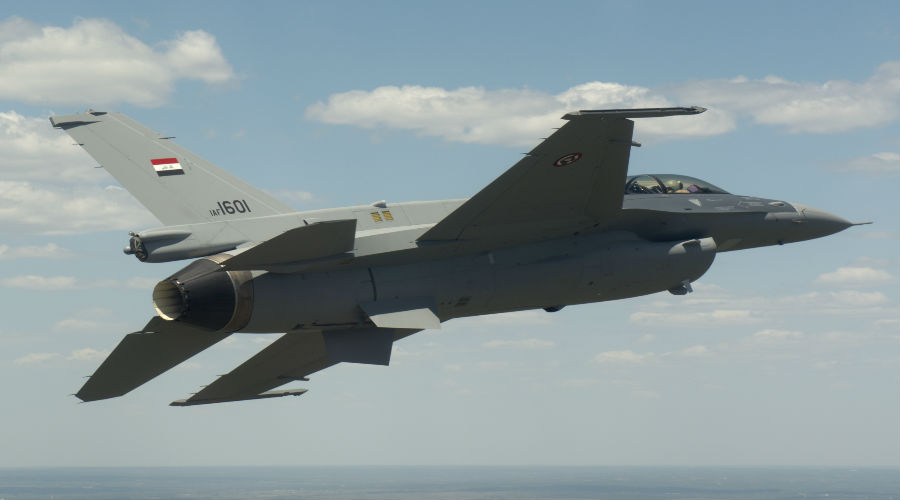Iraq recently started to launch military strikes against ISIS outside its territory. Iraqi F-16 jets attacked the governorate of Deir Ezzor near the Syrian border on April 19, killing dozens of ISIS’ commanders and cadres. The move gained special importance not because it represents a new attempt to crack down on the group’s cells and prevent them from returning to Iraqi territory, but because it was not far from the consequences of the military strike launched by the United States, Britain and France on the Syrian regime’s chemical weapons facilities, after the Syrian regime was accused of using these weapons in its military attacks on Douma City.
Remarkably, Baghdad has not expressed unequivocal support for the tripartite strike, which was a sign that its position is in contrast with that of Washington, although the recent Iraqi strikes were conducted in coordination with the global coalition against ISIS.
Visible Contrast
Baghdad justified the strikes by its interest in cracking down on ISIS inside Syrian territory. According to an official statement from the office of Haider al-Abadi, Iraqi prime minister and commander-in-chief of the armed forces, the strikes were conducted to reduce the danger posed by fighters ISIS group for Iraqi territory. Brigadier General Yahya Rasool, a spokesman of the Iraqi ministry of defense and the Joint Operations Command said that carrying out airstrikes achieved the set goal of killing 36 terrorists including commanders of ISIS. The military intelligence noted that the strikes targeted positions including locations where ISIS commanders were meeting.
Interestingly, Iraq showed clear reservations about the strikes conducted by the three Western states against the Syrian regime’s chemical weapons facilities. Of course, this cannot be viewed separately from determinants influencing the policy pursued by Baghdad to deal with emergency developments in the regional arena. Most importantly is its relationship with regional and world powers involved in the Syrian crisis, such as the United States, Iran and Turkey, as well as its interest in prioritizing the war on ISIS because forcing the organization out of its main strongholds, which it seized over the past years, does not mean that threats posed by ISIS have been reduced. This is especially so because of its attempts to return to these areas using its cells that were not eliminated in the past period.
These reservations became evident when a number of Iraqi officials emphasized that it is Western strike should not impact the main goal of eliminating remaining ISIS cells inside Iraq and Syria and degrading its ability to reinvigorate its activity. In this context, the central government's spokesman Saad al-Hadithi said the developments in Syria should not allow the terrorist organization, ISIS, to survive or expand to other areas. Foreign Minister Ibrahim al-Jaafari warned against the potential consequences that the strike can impose on other states.
Divergent positions taken by Baghdad and Washington on the consequences of the Western strike on Syria indicate that messages sent through the Iraqi assault on ISIS positions days later appear to have more political than military significance as part of combating terrorism.
Potential Consequences
This qualitative move has the following two main indications:
1- Enhancing Quadrilateral Cooperation. These fast-paced developments taking place in the Syrian arena may lead to an enhancement of the four-nation coalition backing the Syrian regime that receives special attention from Baghdad whose second military strike against ISIS’ positions inside Syria appear to have been an item on the agenda of talks held between Iraqi officials and Iranian defense minister Amir Hatami during his visit to Baghdad on April 18, one day before the strike was carried out. Hatami visited the headquarters of the joint intelligence center in Baghdad, which is an intelligence-coordination center operated by Russia, Syria, Iraq and Syria, where he applauded Iraq’s role in combating terrorism.
2- Military Involvement in the Syrian Arena. The Iraqi government deployed part of the Popular Mobilization Forces, or Hashd al-Shaabi, along the border with Syria, claiming that the goal is to prevent ISIS elements from infiltrating into Iraq’s heartland once again.
Baghdad was keen on sending out several messages in February 2017, during the first intervention of the Iraqi armed forces in Syria. It signalled that it will chase ISIS even outside the borders. Additionally, several indications revealed that Iraq sought to expand the role of the Hashd al-Shaabi to carry out certain missions in the Syrian arena, and, more specifically, in east of the Euphrates, which is controlled by Kurdish forces supported by the United States, and which includes U.S. and Western military bases. That is why there may be an attempt in the future to expand Iraq’s intervention in Syria to prevent ISIS from resuming its activity.
The Iranian defense minister’s meetings with the commanders of the Hashd al-Shaabi involved with this issue may support such scenario, especially because there are views that the Iraqi military role inside Syria is likely to go beyond just airstrikes to include operations on the ground in the coming period.
In light of the above, it can possibly be concluded that Iraq, through the recent strike inside the Syrian border, sought to send multiple messages. The most important message is the need to keep the focus on military operations carried out by parties involved in the war on ISIS, based on the fact that involvement in other confrontations would impose consequences that the organization may seek to exploit to reinvigorate its activity once again.


